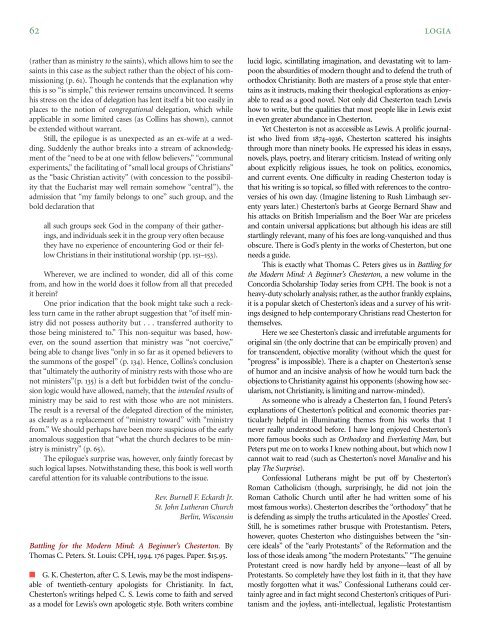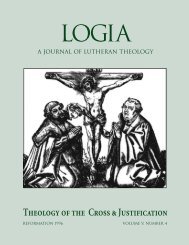04-2 Hermeneutics.pdf
04-2 Hermeneutics.pdf
04-2 Hermeneutics.pdf
- No tags were found...
You also want an ePaper? Increase the reach of your titles
YUMPU automatically turns print PDFs into web optimized ePapers that Google loves.
62 LOGIA(rather than as ministry to the saints), which allows him to see thesaints in this case as the subject rather than the object of his commissioning(p. 61). Though he contends that the explanation whythis is so “is simple,” this reviewer remains unconvinced. It seemshis stress on the idea of delegation has lent itself a bit too easily inplaces to the notion of congregational delegation, which whileapplicable in some limited cases (as Collins has shown), cannotbe extended without warrant.Still, the epilogue is as unexpected as an ex-wife at a wedding.Suddenly the author breaks into a stream of acknowledgmentof the “need to be at one with fellow believers,” “communalexperiments,” the facilitating of “small local groups of Christians”as the “basic Christian activity” (with concession to the possibilitythat the Eucharist may well remain somehow “central”), theadmission that “my family belongs to one” such group, and thebold declaration thatall such groups seek God in the company of their gatherings,and individuals seek it in the group very often becausethey have no experience of encountering God or their fellowChristians in their institutional worship (pp. 151–153).Wherever, we are inclined to wonder, did all of this comefrom, and how in the world does it follow from all that precededit herein?One prior indication that the book might take such a recklessturn came in the rather abrupt suggestion that “of itself ministrydid not possess authority but . . . transferred authority tothose being ministered to.” This non-sequitur was based, however,on the sound assertion that ministry was “not coercive,”being able to change lives “only in so far as it opened believers tothe summons of the gospel” (p. 134). Hence, Collins’s conclusionthat “ultimately the authority of ministry rests with those who arenot ministers”(p. 135) is a deft but forbidden twist of the conclusionlogic would have allowed, namely, that the intended results ofministry may be said to rest with those who are not ministers.The result is a reversal of the delegated direction of the minister,as clearly as a replacement of “ministry toward” with “ministryfrom.” We should perhaps have been more suspicious of the earlyanomalous suggestion that “what the church declares to be ministryis ministry” (p. 65).The epilogue’s surprise was, however, only faintly forecast bysuch logical lapses. Notwithstanding these, this book is well worthcareful attention for its valuable contributions to the issue.Rev. Burnell F. Eckardt Jr.St. John Lutheran ChurchBerlin, WisconsinBattling for the Modern Mind: A Beginner’s Chesterton. ByThomas C. Peters. St. Louis: CPH, 1994. 176 pages. Paper. $15.95.■ G. K. Chesterton, after C. S. Lewis, may be the most indispensableof twentieth-century apologists for Christianity. In fact,Chesterton’s writings helped C. S. Lewis come to faith and servedas a model for Lewis’s own apologetic style. Both writers combinelucid logic, scintillating imagination, and devastating wit to lampoonthe absurdities of modern thought and to defend the truth oforthodox Christianity. Both are masters of a prose style that entertainsas it instructs, making their theological explorations as enjoyableto read as a good novel. Not only did Chesterton teach Lewishow to write, but the qualities that most people like in Lewis existin even greater abundance in Chesterton.Yet Chesterton is not as accessible as Lewis. A prolific journalistwho lived from 1874–1936, Chesterton scattered his insightsthrough more than ninety books. He expressed his ideas in essays,novels, plays, poetry, and literary criticism. Instead of writing onlyabout explicitly religious issues, he took on politics, economics,and current events. One difficulty in reading Chesterton today isthat his writing is so topical, so filled with references to the controversiesof his own day. (Imagine listening to Rush Limbaugh seventyyears later.) Chesterton’s barbs at George Bernard Shaw andhis attacks on British Imperialism and the Boer War are pricelessand contain universal applications; but although his ideas are stillstartlingly relevant, many of his foes are long-vanquished and thusobscure. There is God’s plenty in the works of Chesterton, but oneneeds a guide.This is exactly what Thomas C. Peters gives us in Battling forthe Modern Mind: A Beginner’s Chesterton, a new volume in theConcordia Scholarship Today series from CPH. The book is not aheavy-duty scholarly analysis; rather, as the author frankly explains,it is a popular sketch of Chesterton’s ideas and a survey of his writingsdesigned to help contemporary Christians read Chesterton forthemselves.Here we see Chesterton’s classic and irrefutable arguments fororiginal sin (the only doctrine that can be empirically proven) andfor transcendent, objective morality (without which the quest for“progress” is impossible). There is a chapter on Chesterton’s senseof humor and an incisive analysis of how he would turn back theobjections to Christianity against his opponents (showing how secularism,not Christianity, is limiting and narrow-minded).As someone who is already a Chesterton fan, I found Peters’sexplanations of Chesterton’s political and economic theories particularlyhelpful in illuminating themes from his works that Inever really understood before. I have long enjoyed Chesterton’smore famous books such as Orthodoxy and Everlasting Man, butPeters put me on to works I knew nothing about, but which now Icannot wait to read (such as Chesterton’s novel Manalive and hisplay The Surprise).Confessional Lutherans might be put off by Chesterton’sRoman Catholicism (though, surprisingly, he did not join theRoman Catholic Church until after he had written some of hismost famous works). Chesterton describes the “orthodoxy” that heis defending as simply the truths articulated in the Apostles’ Creed.Still, he is sometimes rather brusque with Protestantism. Peters,however, quotes Chesterton who distinguishes between the “sincereideals” of the “early Protestants” of the Reformation and theloss of those ideals among “the modern Protestants.” “The genuineProtestant creed is now hardly held by anyone—least of all byProtestants. So completely have they lost faith in it, that they havemostly forgotten what it was.” Confessional Lutherans could certainlyagree and in fact might second Chesterton’s critiques of Puritanismand the joyless, anti-intellectual, legalistic Protestantism
















